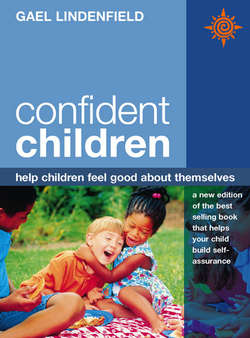Читать книгу Confident Children: Help children feel good about themselves - Gael Lindenfield, Gael Lindenfield - Страница 21
How is confidence acquired and lost? Nature or nurture?
ОглавлениеAre some of us born lucky? Do some children arrive in the world with a genetic predisposition towards being confident? Many people still believe that they do. They talk about children being ‘born shy’ or ‘born leaders’. To some extent, they are right. We all arrive in the world with a predisposition to develop certain personality traits which are often divided broadly into the categories of behaviour styles – extrovert and introvert – and one could argue that, in our modern competitive culture, the more outgoing children are the more likely they are to thrive both socially and intellectually. But no doubt you have met, as indeed I have, very many ‘quietly confident’ people who are exceptions to this rule. So, although an inheritance of ‘extrovert’ genes may be an asset for some children, it certainly brings no guarantee of sound self-confidence. In fact, I am convinced that each one of us arrives in the world with a more or less similar ‘starter-package’ of basic confidence ingredients, and that we all have the personal potential to build on these foundations. In the first few weeks of life every baby I have had contact with has appeared to have good self-esteem, a positive outlook and the will (if not very sophisticated skills) to ask for what he or she wants. I only wish I could say the same of every five year old child I have met.
Such basic observations (plus of course a few years’ acquisition of more sophisticated wisdom!) have left me totally convinced that, with regard to confidence: it is not so much who we are when we are born that counts, but who we are encouraged and allowed to become.
So, the basic assumption underlying this book is that it is how we are nurtured rather than our inherited nature that is important to the development of confidence. And it is the quality of that nurturing which determines our ability to hold on to the precious sense of self-esteem we had at birth and build on our potential to become Super Confident adults.
It is not so much who we are when we are bornthat counts, but who we are encouragedand allowed to become
Nowadays the ‘nurturing’ process of children is a very lengthy and complicated process, and certainly parents do not have the sole responsibility for its progress. Children are ‘brought up’ and critically influenced not just by mothers and fathers but a seemingly endless list of other people such as childminders, teachers, youth leaders, sports coaches, step-parents – not to mention TV presenters, rock stars and advertising executives! However, in most children’s lives I believe that it is still Mum and Dad (natural or otherwise) who wield the most influential guiding power. I certainly have yet to meet anyone lacking in self-confidence whose problems cannot be traced back in some degree to ‘deficient’ parenting. No doubt in taking this line I am preaching to the converted, because dedicated opponents of this theory would hardly be motivated to read this book!
So let’s move on from the well-worn path of the nature/nurture debate and just reflect on exactly what ‘nutrients’ children need to receive in the course of their development, if their potential for self-confidence is to be exploited in full. I have found that these can be divided up into the eight main areas summarized below.
